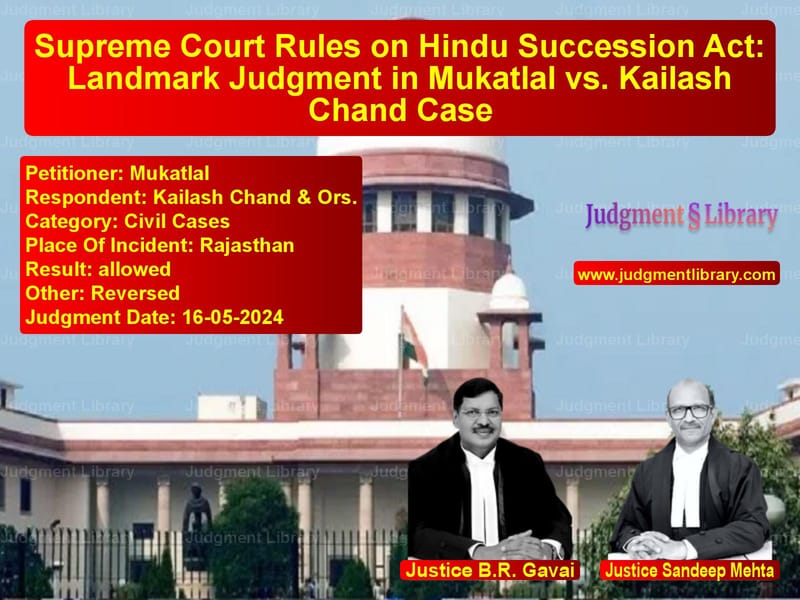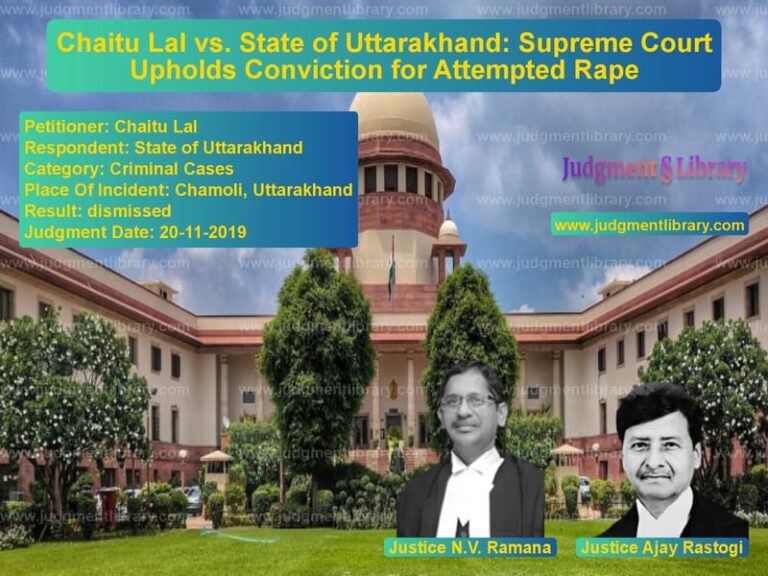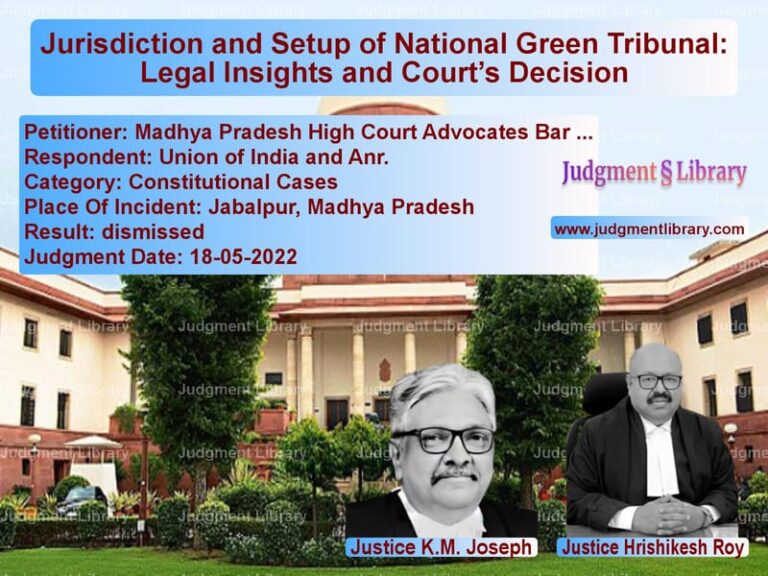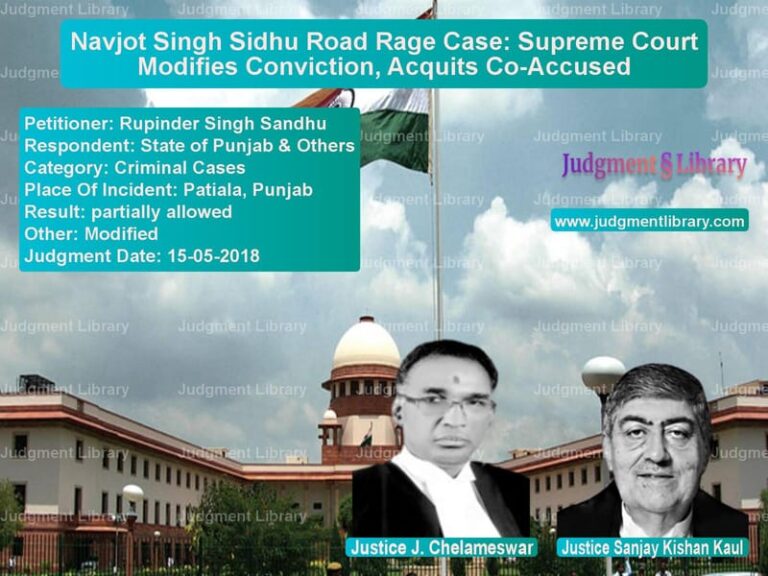Supreme Court Rules on Hindu Succession Act: Landmark Judgment in Mukatlal vs. Kailash Chand Case
The case of Mukatlal vs. Kailash Chand & Ors. is a landmark judgment that clarifies the application of Section 14(1) of the Hindu Succession Act, 1956 and the rights of a widow’s successor in claiming partition of Hindu joint family property. The Supreme Court overturned previous decisions of the Rajasthan High Court, ruling that since the widow was never in possession of the disputed property, her adopted son could not claim ownership through inheritance.
Background of the Case
The dispute centered on a Hindu Undivided Family (HUF) property originally owned by Kishan Lal, which passed to his two sons, Mangilal and Madho Lal. Upon Madho Lal’s death in 1929, his widow, Smt. Nandkanwarbai, remained part of the family but did not inherit direct ownership of the property. She later adopted Kailash Chand in 1959, nearly 30 years after her husband’s death. The case evolved over several decades through multiple legal battles.
Chronology of Events
- 1912: Mangilal, one of the original owners, passed away.
- 1929: Madho Lal, the second son, passed away issueless, survived only by his widow, Smt. Nandkanwarbai.
- 1949: Kanwarlal, son of Mangilal, executed a will in favor of his son, Mukatlal.
- 1959: Smt. Nandkanwarbai filed a suit for declaration of title and possession but was only granted a right to maintenance from the suit property.
- 1973: The Rajasthan High Court upheld the widow’s right to maintenance but did not recognize her ownership of the property.
- 1979: Kailash Chand, as the legal heir of his adoptive mother, filed a revenue suit for partition of the suit property.
- 1983-1993: Multiple appeals and writ petitions led to conflicting rulings on the widow’s property rights.
- 2017: The Rajasthan High Court ruled in favor of Kailash Chand.
- 2024: The Supreme Court overturned the Rajasthan High Court’s judgment and dismissed Kailash Chand’s partition suit.
Legal Issues Considered
The Supreme Court addressed several key legal questions:
- Whether a Hindu widow who was never in possession of property could claim full ownership under Section 14(1) of the Hindu Succession Act.
- Whether her adopted son could inherit ownership rights in the property and seek partition.
- Whether the earlier civil court ruling granting only maintenance rights to the widow precluded her heir from claiming partition.
Arguments by the Appellant (Mukatlal)
The appellant, Mukatlal, contended that:
- The widow, Smt. Nandkanwarbai, never possessed the property and was only granted maintenance rights.
- Since she had no ownership, her adopted son could not claim partition under Hindu law.
- The previous rulings recognizing only maintenance rights were binding and could not be overturned.
- The revenue court erred in granting partition based on the widow’s claim, which had no legal foundation.
Arguments by the Respondent (Kailash Chand & Ors.)
The respondent argued that:
- Under Section 14(1) of the Hindu Succession Act, a Hindu woman’s right to maintenance can translate into full ownership if she possesses the property.
- Although the widow was not in actual possession, her right to maintenance should have been enough to claim ownership.
- The property should be partitioned as joint family property, allowing the widow’s adopted son to claim a share.
Supreme Court’s Judgment
The Supreme Court ruled in favor of the appellant, Mukatlal, and set aside the Rajasthan High Court’s ruling. The Court made the following observations:
“For establishing full ownership under Section 14(1) of the Hindu Succession Act, a Hindu female must not only be possessed of the property but must have acquired it by way of inheritance, partition, gift, or in lieu of maintenance. Mere right to maintenance without possession does not create ownership.”
- The Court found that the widow was never in possession of the suit property, meaning Section 14(1) did not apply.
- Since the widow had no ownership rights, her adopted son, Kailash Chand, could not inherit ownership or claim partition.
- The earlier court ruling granting only maintenance rights was final and could not be challenged through a revenue suit.
- The Court reversed the Rajasthan High Court’s decision and dismissed the partition suit.
Impact of the Judgment
This ruling has significant implications for Hindu succession law:
- Clarification on Section 14(1): The judgment confirms that mere maintenance rights do not grant full ownership under Hindu succession law.
- Protection of Will-Based Inheritance: The ruling upholds the validity of wills in determining property inheritance.
- Restriction on Successor Claims: Adopted heirs cannot claim partition of family property unless the predecessor had ownership rights.
- Judicial Precedents Strengthened: The case reinforces past rulings on maintenance versus ownership distinctions in Hindu law.
Conclusion
The Supreme Court’s decision in Mukatlal vs. Kailash Chand is a landmark ruling clarifying Hindu succession laws. The judgment reinforces that a widow’s right to maintenance does not automatically translate into property ownership. Since she never possessed the property, her adopted son had no legal claim to partition. This decision sets a strong precedent in property disputes related to Hindu family law and succession.
Petitioner Name: Mukatlal.Respondent Name: Kailash Chand & Ors..Judgment By: Justice B.R. Gavai, Justice Sandeep Mehta.Place Of Incident: Rajasthan.Judgment Date: 16-05-2024.
Don’t miss out on the full details! Download the complete judgment in PDF format below and gain valuable insights instantly!
Download Judgment: mukatlal-vs-kailash-chand-&-ors.-supreme-court-of-india-judgment-dated-16-05-2024.pdf
Directly Download Judgment: Directly download this Judgment
See all petitions in Property Disputes
See all petitions in Succession and Wills
See all petitions in Judgment by B R Gavai
See all petitions in Judgment by Sandeep Mehta
See all petitions in allowed
See all petitions in Reversed
See all petitions in supreme court of India judgments May 2024
See all petitions in 2024 judgments
See all posts in Civil Cases Category
See all allowed petitions in Civil Cases Category
See all Dismissed petitions in Civil Cases Category
See all partially allowed petitions in Civil Cases Category







